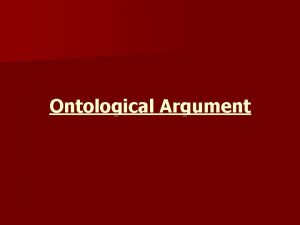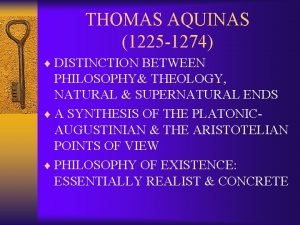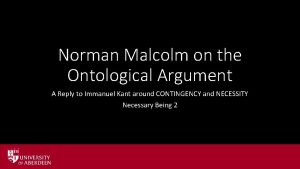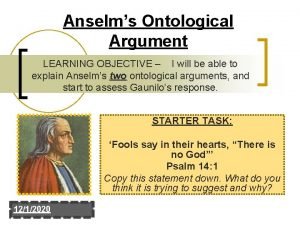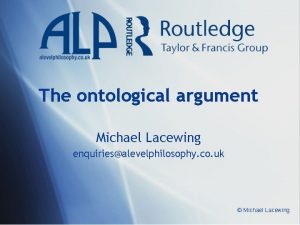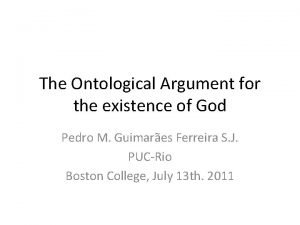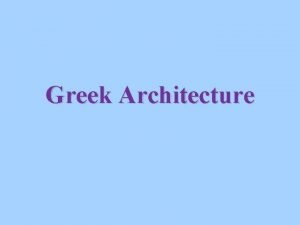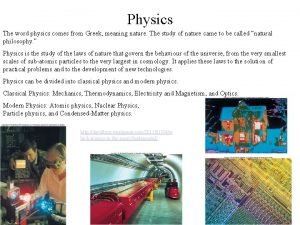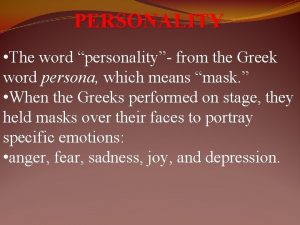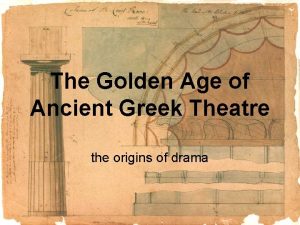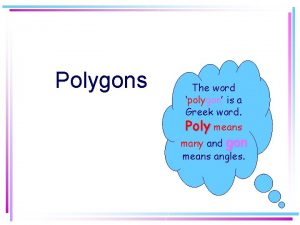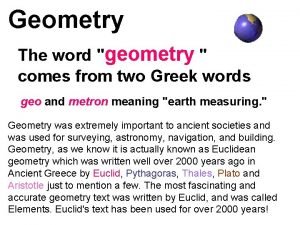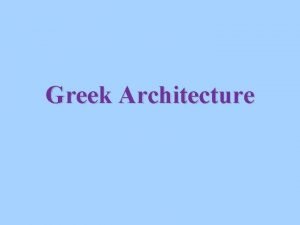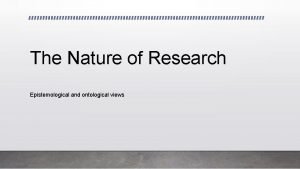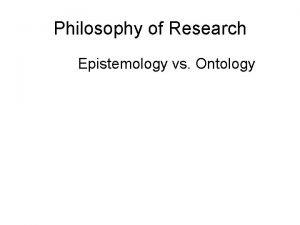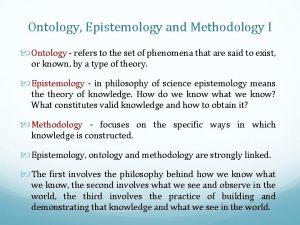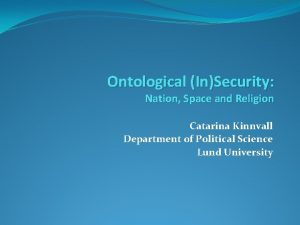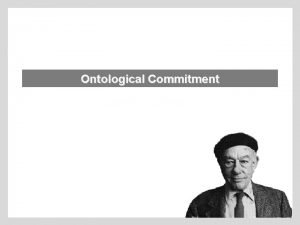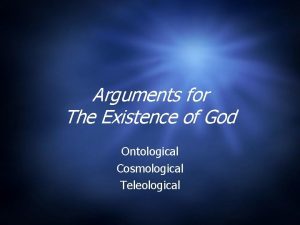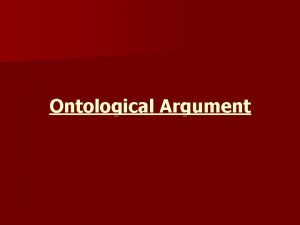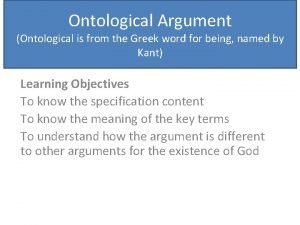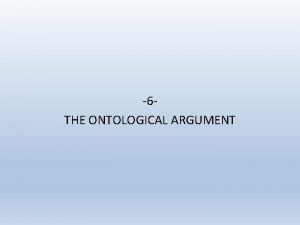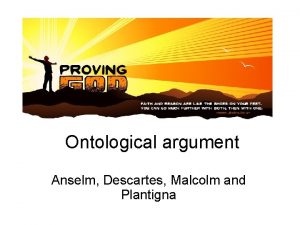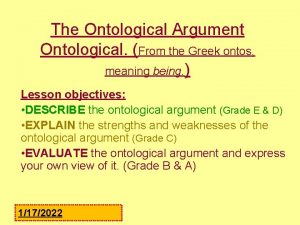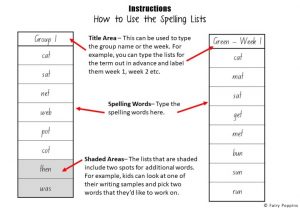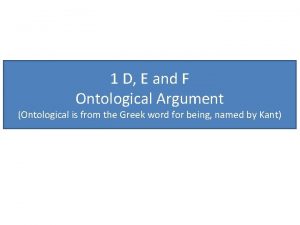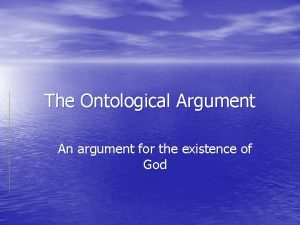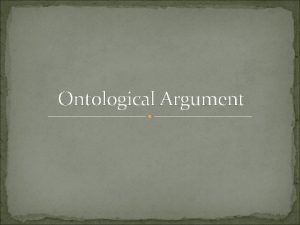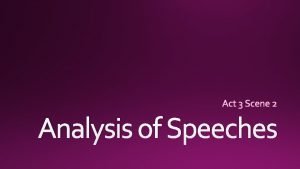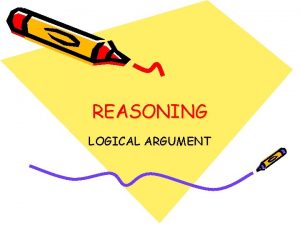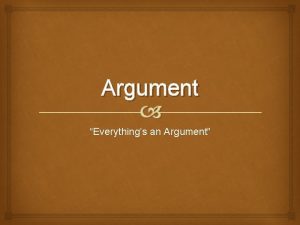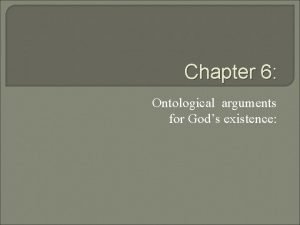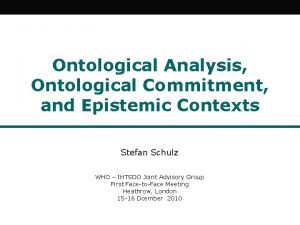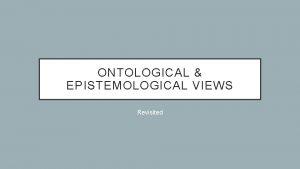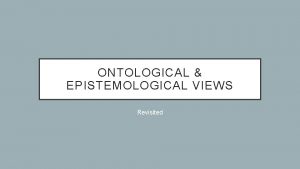Ontological Argument Ontological is from the Greek word























- Slides: 23

Ontological Argument (Ontological is from the Greek word for being) Learning Objectives To know the specification content To know the meaning of the key terms To understand how the argument is different to other arguments for the existence of God

The Big Picture • The ontological argument for the existence of God • Theories about the nature of faith and its relation with reason and revelation • Propositional and non-propositional concepts of revelation Candidates will be expected to be familiar with the relevant arguments of major philosophers from the past (Anselm, Descartes, Gaunilo, Hume, Kant and Kiekegaard) as well as modern philosophers, but questions will not be set on individual philosophers.

2. Key terms – add to page 1 of your booklet �A priori –prior to experience �Deductive – �Analytic statements – true by definition �Contingent – can exist or not exist, it depends on other for existence �Necessary existence – not contingent Factual necessity – exists �Logical necessity – true of necessity e. g. Triangle has 3 angles

Introduction page 3 of the booklet The ontological argument is based on a definition of the word God, if you understand God in terms of the definition it is logical to conclude that he exists and that his existence is not just possible but necessary. Origins St Augustine said ‘God is that being to which none was superior’ The philosopher most associated with this argument is St Anselm, he lived in the 11 th Century and was the Archbishop of Canterbury and a canonised saint of the Roman Catholic Church. 2. Summarise the ontological argument in 20 words

Things you need to understand Anselm’s essential claim is… Existence is a predicate of God (it is a property or quality of God’s nature). By analysing the word God it will be obvious, according to Anselm, that God exists. In ‘God exists’ the subject is ‘God’, the predicate is ‘exists’.

A predicate is… ‘an intrinsic property or quality of something’ Predicates of an elephant might be… A trunk, size, long ears, being a mammal, tusks, long memory, etc…

Predicates of…? • The Earth • A Car • A Human 3. How was Anselm trying to prove God? 4. Why did other Christians reject Anselm’s argument?

Anselm’s First Argument 1) 2) 3) God is the greatest possible being which can be conceived (thought) of –’that than which nothing greater can be known’ God may exist either in the mind alone, or in reality as well. Something which exists in reality and in the mind is greater than something which exists just as an idea in the mind alone. A lottery win is better in reality than in the mind alone! Conclusion: 4) God must exist in reality and in the mind (or we have not thought of the greatest possible being).

Anselm’s Ontological Argument ‘Fools say in their hearts, “There is no God”’ Psalm 14: 1 Copy this statement down. What do you think it is trying to suggest and why? Read page 8 of Ellerton-Harris if you are stuck

Painter analogy In the mind In reality • ££££££

Homework checker Tasks from the booklet Watch the video – write notes Summary of Anselm 5. How did Anselm define God? 6. What perfections must this being have? 7. What does the fool understand? 8. Why does this being have to exist in understanding and reality? 9. Summarise Anselm’s analogy. 10. Why does Anselm believe God’s existence is necessary?

Ontological Argument Lesson 2 Learning Objectives • To know the specification content • To know the meaning of the key terms • To understand how the argument is different to other arguments for the existence of God • To know Anselm’s 2 versions How do these pictures connect to the ontological argument?

1. Reductio ad absurdum – if he does exist in the mind alone then he is not greatest possible being. 2. Anyone who doesn’t accept it is a ‘fool’, as it is plain and obvious. 3. God’s existence is analytic (once we analyse the definition of the term we will see that God exists). 4. Painter and painting analogy (mind and reality). page 5 5. ‘a being which nothing greater can be conceived’: Anselm expects everyone will accept this definition.

Features of the first argument (for an essay plan). 1) ‘a being which nothing greater can be conceived’: Anselm expects everyone will accept this definition. 2) Reductio ad absurdum – if he does exist in the mind alone then he is not greatest possible being. 3) God’s existence is analytic (once we analyse the definition of the term we will see that God exists). 4) Painter and painting analogy (mind and reality). page 5 5) Anyone who doesn’t accept it is a ‘fool’, as it is plain and obvious.

Anselm’s second argument 1) God is that being nothing greater than which can be known. 2) Something which cannot be thought not to exist is greater than anything which can be thought not to exist. Conclusion: 3) Therefore, God must necessarily exist

Argument 2: In simpler language… 1) You can’t think of anything greater than God. 2) Necessary things are greater than contingent things. Conclusion 3) God is necessary and must exist

Features of Anselm’s second argument 1) This adds the idea that it is impossible for God not to exist – in other words, God is necessary. 2) It has been argued that his second argument was aimed at believers as a proof that existence in God is rational – to justify a belief in God.

Gaunilo’s response to Anselm Gaunilo was a contemporary of Anselm, he was a monk who rejected Anselm’s argument in ‘On Behalf of the fool’ using three arguments…. 1) 2) 3) On Gossip – the fool could have all kinds of made up things in his head, gossip for instance is unreliable – how should he be able to discern what is true and what is not? You can’t define things into existence The Perfect Island

Gaunilo offers a counter ‘reductio ad absurdum’ P 1 I can conceive of _______ P 2 Such an _____ must possess all perfections P 3 Existence is a perfection/predicate Conclusion Therefore, the perfect ____ exists

The Perfect Island – in booklet 1) 2) 3) What predicates would it have? perfect island 4) Gaunilo invited his readers to think of the greatest, or most perfect, conceivable island. As a matter of fact, it is likely that no such island actually exists. However, his argument would then say that we aren't thinking of the greatest conceivable island, because the greatest conceivable island would exist, as well as having all those other desirable properties. Since we can conceive of this greatest or most perfect conceivable island, then it must exist.

Examples • Think of some other examples you could include to demonstrate the point about the Perfect Island in an essay…

Anselm’s reply What issues does Anselm raise with Gaunilo’s challenges? Page 6 of the WJEC booklet Page 12 of booklet 1 Complete the task on page 13

Homework • Complete page 14 • Use the info in this Power point and the booklets to write an essay plan for • ‘Examine a classical version of the ontological argument’ (30 marks). • Pick three main points and write out three paragraphs. Read pages 15 - 20 For next lesson
 Anselm argument for god
Anselm argument for god Ontological argument for god
Ontological argument for god Diagram ontological argument
Diagram ontological argument Challenges to the ontological argument
Challenges to the ontological argument Ontological argument for god
Ontological argument for god Norman malcolm ontological argument
Norman malcolm ontological argument Gaunilo's response to anselm's ontological argument
Gaunilo's response to anselm's ontological argument Anselm argument for god
Anselm argument for god Ontological argument
Ontological argument Parts of a greek temple
Parts of a greek temple Computer comes from
Computer comes from The word physics comes from
The word physics comes from The word personality comes from the greek word __________
The word personality comes from the greek word __________ When was the golden age of greek theatre
When was the golden age of greek theatre Polygon formulas
Polygon formulas The two greek words of the word geometry are geo and metro.
The two greek words of the word geometry are geo and metro. Ionic vs doric columns
Ionic vs doric columns How to identify epistemology in research
How to identify epistemology in research Constructivist epistemology definition
Constructivist epistemology definition Epistemology vs ontology
Epistemology vs ontology Ontological security
Ontological security Quine ontological commitment
Quine ontological commitment Ontological cosmological teleological
Ontological cosmological teleological Ontological distance
Ontological distance
